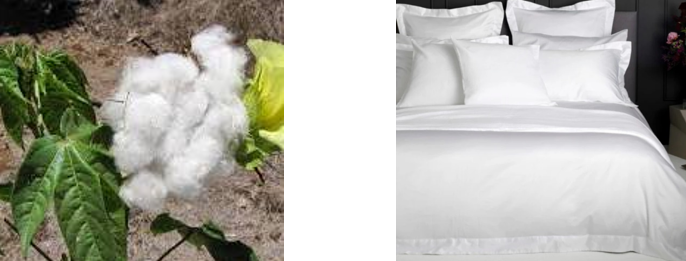FABRIC KNOW HOW

By Camilla Swart
Many retailers of bed linen assume that the following terms are generally understood, but I have found this not to be the case!
When we speak about THREAD COUNT, we mean the number of threads woven into one square inch of fabric. The warp or lengthwise threads are counted and that number added to the weft or crosswise thread. The resulting sum being the thread count.
The higher the thread count the denser the weave, but a higher thread count does not necessarily mean that the fabric is better suited to your needs. 1000 Thread count fabric is heavy and very dense, and can be very warm to sleep under, as it is less breathable.
magnified fabric
Mention the word PERCALE and you either have a baffled look entering the eyes or a vague perception. Neither is helpful.
Percale is a closely woven plain weave fabric for end use being bed linen, clothing, or industrial use. Percale has a crisp handle, is not shiny and has a dense look when held up to the light.
It is cool and breathable, and is characterised by the delightful ‘crack’ sound when opening out folded product and shaking it.
Percale/plain weave vs Sateen weave Characteristic matt look of percale
Nothing compares to the luxurious softness of SATEEN.
Sateen is the name of a type of weave, but also of fabric woven in this way. Sateen weave is characterised by a smooth glossy surface and soft luxurious handle.
Sateen fabric is usually woven from long staple cotton which gives it the sheen and softness. The surface of the fabric shows long weft/crosswise threads on the surface, unlike the regularity of the plain weave of percale fabric.
Diagram of satin/sateen weave Sateen fabric close up
Characteristic sheen of sateen fabric Cotton Sateen pillowcases
There is so much said about EGYPTIAN COTTON that I feel we should explain what it really is. Historically Egypt grew a type or genus of cotton know as Gossypium Barbadense which had longer and finer fibres (staples) than other cotton. This produced soft and strong fabric.
Unfortunately, the name has been corrupted and product which is made from similar long staple cotton is then sold as Egyptian Cotton. The only way to guarantee authenticity is to buy your Egyptian Cotton from a reliable and trusted retailer.
Only the proper genus Gossypium Barbadense can be made into real Egyptian Cotton with the relevant properties of softness and strength. Egyptian cotton is characterised by softness and durability. Linen Drawer Egyptian Cotton is certified for authenticity.
Cotton boll from Gossypium Barbadense Characteristic sheen of Egyptian Cotton
In conclusion the best advice when buying any type of bed linen is the following two statements:
“What feels right to you, is right for you” and
‘Quality is remembered long after price is forgotten”





.png)
.png)

